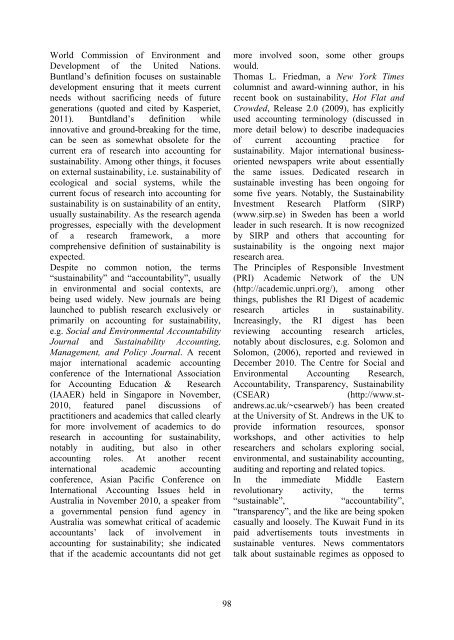Selected papers~ SPECIAL EDITION - Index of
Selected papers~ SPECIAL EDITION - Index of
Selected papers~ SPECIAL EDITION - Index of
You also want an ePaper? Increase the reach of your titles
YUMPU automatically turns print PDFs into web optimized ePapers that Google loves.
World Commission <strong>of</strong> Environment and<br />
Development <strong>of</strong> the United Nations.<br />
Buntland’s definition focuses on sustainable<br />
development ensuring that it meets current<br />
needs without sacrificing needs <strong>of</strong> future<br />
generations (quoted and cited by Kasperiet,<br />
2011). Buntdland’s definition while<br />
innovative and ground-breaking for the time,<br />
can be seen as somewhat obsolete for the<br />
current era <strong>of</strong> research into accounting for<br />
sustainability. Among other things, it focuses<br />
on external sustainability, i.e. sustainability <strong>of</strong><br />
ecological and social systems, while the<br />
current focus <strong>of</strong> research into accounting for<br />
sustainability is on sustainability <strong>of</strong> an entity,<br />
usually sustainability. As the research agenda<br />
progresses, especially with the development<br />
<strong>of</strong> a research framework, a more<br />
comprehensive definition <strong>of</strong> sustainability is<br />
expected.<br />
Despite no common notion, the terms<br />
“sustainability” and “accountability”, usually<br />
in environmental and social contexts, are<br />
being used widely. New journals are being<br />
launched to publish research exclusively or<br />
primarily on accounting for sustainability,<br />
e.g. Social and Environmental Accountability<br />
Journal and Sustainability Accounting,<br />
Management, and Policy Journal. A recent<br />
major international academic accounting<br />
conference <strong>of</strong> the International Association<br />
for Accounting Education & Research<br />
(IAAER) held in Singapore in November,<br />
2010, featured panel discussions <strong>of</strong><br />
practitioners and academics that called clearly<br />
for more involvement <strong>of</strong> academics to do<br />
research in accounting for sustainability,<br />
notably in auditing, but also in other<br />
accounting roles. At another recent<br />
international academic accounting<br />
conference, Asian Pacific Conference on<br />
International Accounting Issues held in<br />
Australia in November 2010, a speaker from<br />
a governmental pension fund agency in<br />
Australia was somewhat critical <strong>of</strong> academic<br />
accountants’ lack <strong>of</strong> involvement in<br />
accounting for sustainability; she indicated<br />
that if the academic accountants did not get<br />
98<br />
more involved soon, some other groups<br />
would.<br />
Thomas L. Friedman, a New York Times<br />
columnist and award-winning author, in his<br />
recent book on sustainability, Hot Flat and<br />
Crowded, Release 2.0 (2009), has explicitly<br />
used accounting terminology (discussed in<br />
more detail below) to describe inadequacies<br />
<strong>of</strong> current accounting practice for<br />
sustainability. Major international businessoriented<br />
newspapers write about essentially<br />
the same issues. Dedicated research in<br />
sustainable investing has been ongoing for<br />
some five years. Notably, the Sustainability<br />
Investment Research Platform (SIRP)<br />
(www.sirp.se) in Sweden has been a world<br />
leader in such research. It is now recognized<br />
by SIRP and others that accounting for<br />
sustainability is the ongoing next major<br />
research area.<br />
The Principles <strong>of</strong> Responsible Investment<br />
(PRI) Academic Network <strong>of</strong> the UN<br />
(http://academic.unpri.org/), among other<br />
things, publishes the RI Digest <strong>of</strong> academic<br />
research articles in sustainability.<br />
Increasingly, the RI digest has been<br />
reviewing accounting research articles,<br />
notably about disclosures, e.g. Solomon and<br />
Solomon, (2006), reported and reviewed in<br />
December 2010. The Centre for Social and<br />
Environmental Accounting Research,<br />
Accountability, Transparency, Sustainability<br />
(CSEAR) (http://www.standrews.ac.uk/~csearweb/)<br />
has been created<br />
at the University <strong>of</strong> St. Andrews in the UK to<br />
provide information resources, sponsor<br />
workshops, and other activities to help<br />
researchers and scholars exploring social,<br />
environmental, and sustainability accounting,<br />
auditing and reporting and related topics.<br />
In the immediate Middle Eastern<br />
revolutionary activity, the terms<br />
“sustainable”, “accountability”,<br />
“transparency”, and the like are being spoken<br />
casually and loosely. The Kuwait Fund in its<br />
paid advertisements touts investments in<br />
sustainable ventures. News commentators<br />
talk about sustainable regimes as opposed to


